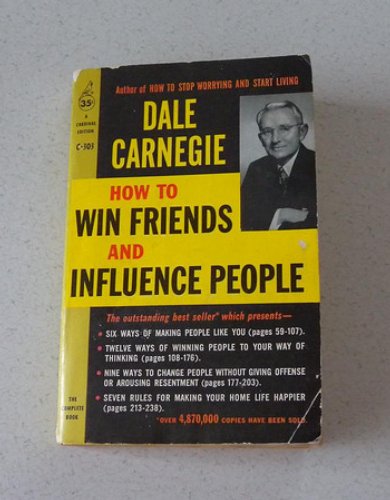The greatest ability in business is to get along with others and to influence their actions. – John Hancock

Whether it’s at work or at home, this is the book that tells you how it is to be done. My copy isn’t quite that old, but it’s just is as well read.
What does that mean?
As one of the founders of the American Revolution, his name is known by many for his large and flamboyant signature on the Declaration of Independence. However, he was a business man and a more practical man. This quote describes his preferred method of making change.
The first part of the quote is about getting along. If you’re at war, you aren’t interested in getting along, but are focused on defeating the other party. In business, if you can’t get along with someone, you’re going to have a hard time getting them to buy your stuff, right?
In business, unlike in war, you have to influence others. You have to entice them or inform them, and help them see things your way. Usually, that is to see what you are selling as the best thing ever, and very well suited to their problem, while the products of your competitors are inferior.
There are many methods for getting along with people, and many more for influencing them (see Dale Carnegie’s seminal book, How to Win Friends and Influence People). I want to focus the ethics of influence, as I believe there are far more unethical ways to gain influence.
Why is ethical influence important?
Because I said so! Gee, that was influential, wasn’t it? Perhaps if I stood over you and bellowed, you might agree. But would that be ethical, or would that be using fear and intimidation to coerce you, rather than ethically influencing you?
In the field of influence, there are a lot of gray areas, and lots of ways to justify the use of questionable methods. At what point is a salesman using a metaphor to influence you, as opposed to lying to you about what can be done? Where, exactly, is that line?
The exact location of a line between ethical and unethical behavior is going to depend on the values of a person, their beliefs, and their cultural influences. What might be fine in one place might be illegal in another.
But would you really want to win an argument or bring someone to agree with you by lying? What would happen when they found out you lied? Would you ever have influence with them again? This is an example of why I believe that influence needs to be done in an ethical manner to be truly useful.
Where can I apply this in my life?
Hopefully you already do. Hopefully you aren’t the kind of person who lies on a regular basis to get their way, or to get others to agree with you. I hope that you try to use ethical methods, as you see them, in all your dealings with other people.
The point where this gets tricky is when cultures meet. Does the other culture take the same viewpoint on how far you can stretch the truth when describing how wonderful your product is? Whether your product is a good, a service, or you (like when you’re trying to get hired), if it doesn’t do what the customer expects, there’s going to be trouble, right?
One of the things the book (from above) encourages you to do as part of getting along with others, is have them talk about themselves and what they like. This helps you better understand how they think, and what is important to them.
If you can steer the discussion towards the product in question, you may well get some valuable advice from the customer on how to influence them by making sure they know how what you have will fill all their needs. But influence isn’t only a business proposition.
What about your friends, family, co-workers, and social contacts? Have you ever needed to influence them? I know I have, and I imagine you have as well. Hopefully, you know something about these people, and their likes and dislikes. You probably know what they want, and can use that to help them understand why they should agree with you.
This quote really applies to almost every personal interaction we have, whether it be face to face, over the phone, or even in e-mail, text messages or in blog postings. Every time you try to get someone to do something or stop doing something, that’s influence, right?
I hope I have persuaded you to consider how you go about using your influence on other people. I also hope that you will now be better able to recognize when such events are happening. I hope that you will always do the right thing, and be as ethical as possible when exerting your influence.
Here’s to new friends and our ability to ethically influence others.
From: Twitter, @WEPromote
confirmed at : http://www.brainyquote.com/quotes/quotes/j/johnhancoc142583.html
Photo by zieak
Happy Birthday to John Hancock, born 23 January, 1737.






